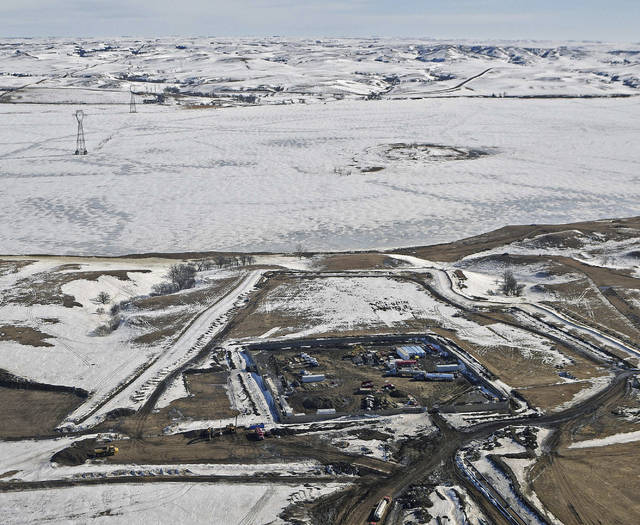Appeals court refuses to stop oil in Dakota Access pipeline

ASSOCIATED PRESS
Aerial file photo, shows a site where the final phase of the Dakota Access pipeline is taking place with boring equipment routing the pipeline underground and across Lake Oahe to connect with the existing pipeline in Emmons County near Cannon Ball, N.D.
BISMARCK, N.D. >> An appeals court on Saturday refused a request from two American Indian tribes for an “emergency” order that would prevent oil from flowing through Dakota Access pipeline.
The decision by the U.S. Court of Appeals for the District of Columbia Circuit means the $3.8 billion pipeline to move North Dakota oil to a distribution point in Illinois could be operating as early as Monday, even as the tribes’ lawsuit challenging the project moves forward.
The Standing Rock and Cheyenne River Sioux tribes have challenged an earlier ruling by U.S. District Judge James Boasberg not to stop final construction of the pipeline, and they wanted the appeals court to halt any oil flow until that’s resolved.
The appeals court said the tribes hadn’t met “the stringent requirements” for such an order.
The tribes had asked Boasberg to direct the Army Corps of Engineers to withdraw permission for Dallas-based developer Energy Transfer Partners to lay pipe under Lake Oahe in North Dakota, which the Corps manages for the U.S. government. The stretch under the Missouri River reservoir is the last piece of construction for the pipeline.
The company is wrapping up pipe work under the lake and has said oil could start flowing between Monday and Wednesday.
Don't miss out on what's happening!
Stay in touch with breaking news, as it happens, conveniently in your email inbox. It's FREE!
The tribes fear the pipeline could harm their water supply and their right to practice their religion, which relies on clean water. ETP disputes that.
The tribes’ appeal rests on the religion argument. Boasberg has said he doesn’t think the tribes have a strong case on appeal. He also said ETP would be “substantially harmed” by a delay in pipeline operations.



